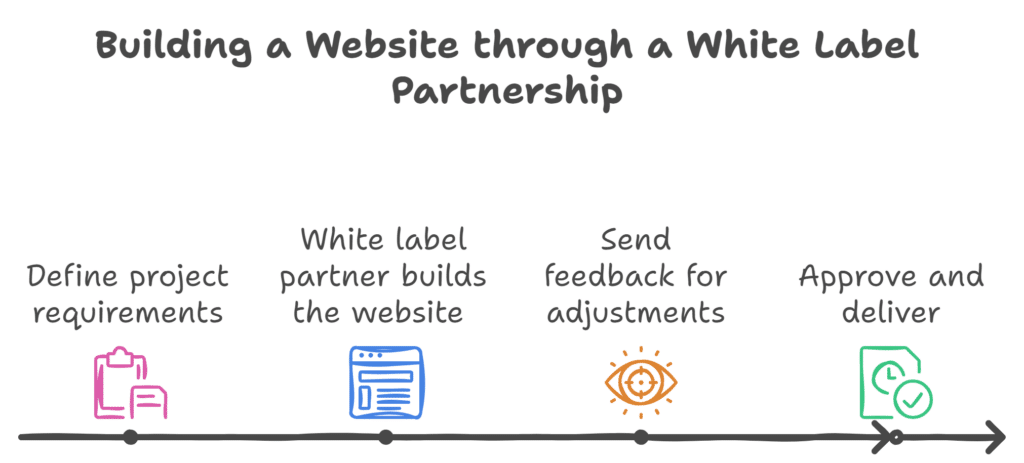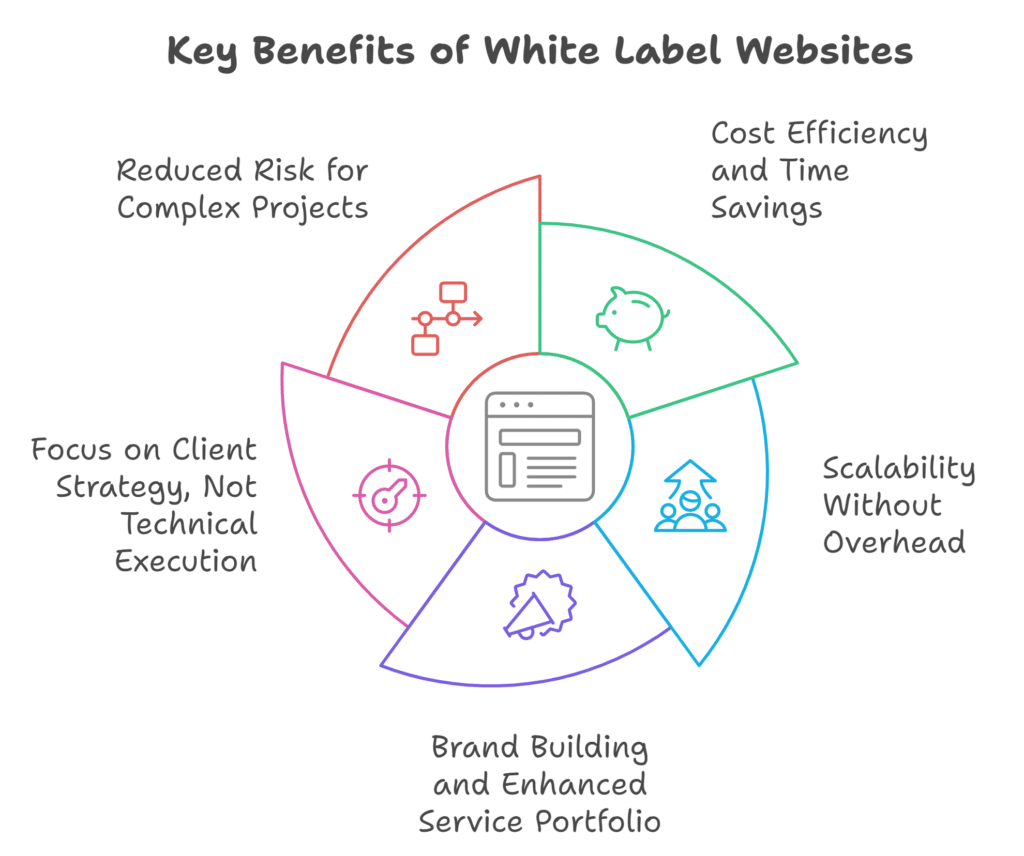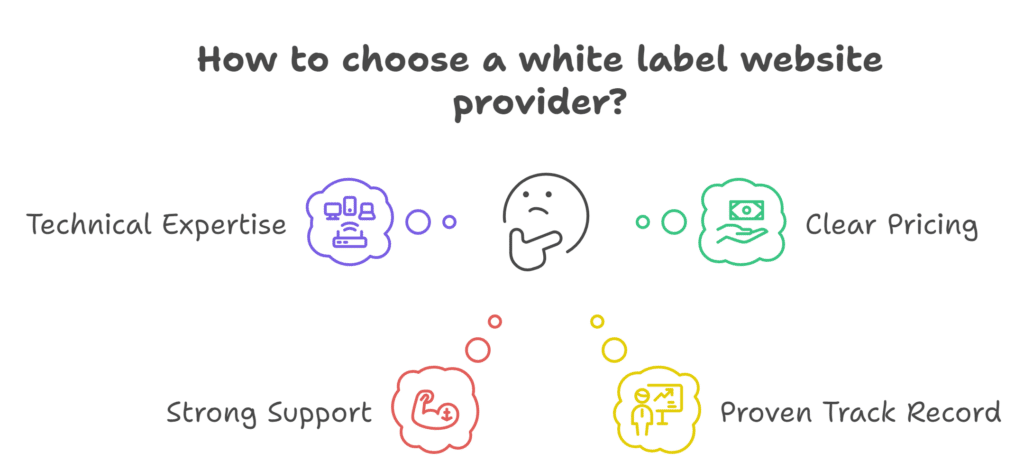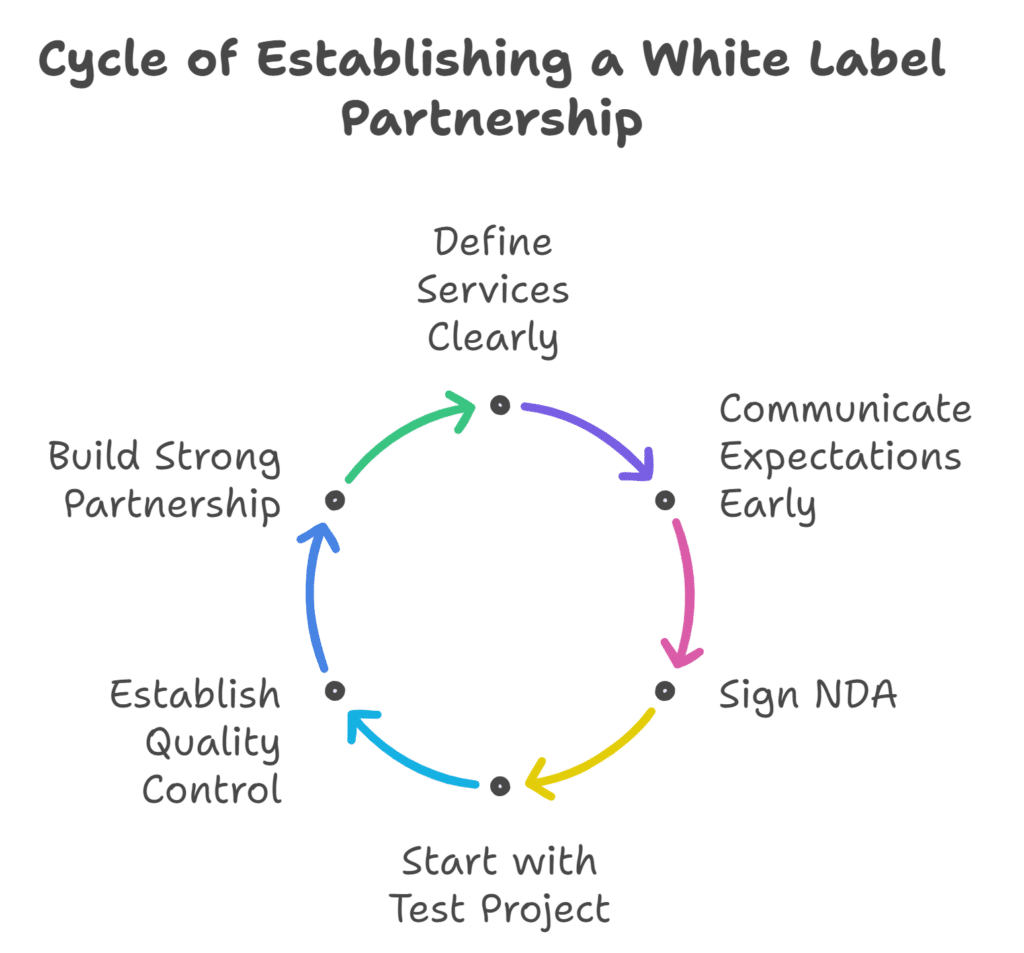As someone who’s spent quite some time working with a white label company, I’ve seen firsthand how white label website solutions can be a game-changer for digital agencies and freelancers. If you are looking to scale up your offerings and increase profits, all without the overhead costs, white labeling might be your best choice too.
In this guide, I’ll break down everything you need to know about white label sites. Whether you’re an agency owner or a freelancer looking to transition into a virtual agency, I’ll share insights on the benefits, challenges, and strategies for success. By the end, you’ll have a solid understanding of what is white labeling and how it can be a key to the remarkable growth of your business.
What is a White Label Website?
A white label website is built by a third-party company but sold under the branding and logo of a different company. This is similar to white label products, which are manufactured by a third party but sold by retailers under their own branding.
👋 Psst...Have you seen the all-new Feedcoyote yet? They've got a new look, more freelance opportunities, and the best collaboration tool for freelancers! Join over 100,000 fellow freelancers who network, find clients, and grow their business with Feedcoyote. Join for Free »
For example, a digital agency may hire a white label web development partner to create websites for its clients. The white label agency handles the technical aspects of building the website, but in an invisible manner. Once completed, the digital agency delivers the finished website to the end client as if it were developed in-house, under its own branding.
This setup allows the digital agency to focus on core competencies, such as client management, marketing, sales, or design, while the white label partner manages the technical execution.
To stay competitive in the digital agency market, turning to expert IT services can be invaluable too. Leveraging resources like Corsica Technologies managed IT services provides an integrated approach to technical support. This ensures agencies maintain efficient operations and meet industry standards without allocating excess internal resources.
How It Works:

- The digital agency defines the project requirements and shares them with the white label partner.
- The white label partner builds the website to meet these specifications, incorporating any requested customizations.
- The digital agency reviews the completed site, provides feedback, and the white label partner makes any necessary adjustments.
- The digital agency approves the final version, and the website is delivered to the end client under the digital agency’s name, maintaining consistency in quality and branding.
5 Benefits of White Label Websites

Now that we’ve covered what is white labeling and how it works, let’s dive into why it is such a popular solution among agencies. From my experience, there are several compelling reasons why so many businesses are turning to white label solutions.
Here are the 5 most impactful benefits I’ve seen in practice:
#1. Cost Efficiency and Time Savings
Many of our agency partners are surprised by how much time and money they save with white label services. Instead of building each site from scratch, they can rely on our team to handle the development process efficiently. This means faster project turnarounds, fewer internal resources spent, and ultimately, the ability to take on more clients.
#2. Scalability Without Overhead
White label websites allow agencies to scale up quickly without needing to hire additional staff or invest in training in-house developers. During peak project seasons, we’ve been able to support our partners by handling multiple projects at once, helping them meet tight deadlines and manage increased workloads.
#3. Brand Building and Enhanced Service Portfolio
Offering white label projects has enabled our partners to position themselves as full-service digital agencies, providing complete website solutions without having to master every technical detail. This enhances their service portfolio and also strengthens their brand presence in the market.
#4. Focus on Client Strategy, Not Technical Execution
With the technical work handled externally, agencies can spend more time focusing on client management and strategy. This means they can be more involved in understanding what clients need and guiding the overall project direction.
#5. Reduced Risk for Complex Projects
Agencies sometimes hesitate to take on more complex projects due to resource limitations. With an experienced white label partner, they can tackle these opportunities knowing they have the right support in place to deliver.
3 Challenges of White Label Websites
While a white label website offers plenty of benefits, there are a few challenges you should be aware of before diving in. Throughout my work, I’ve seen some common pain points that can pop up if not properly managed. The key is understanding these challenges so you can prepare for them.
- Customization Limitations
White label websites typically offer a range of customization options, but challenges can arise if a client requires advanced features or highly specific functionality that goes beyond the standard configurations. While reputable providers can handle most typical requests, achieving extremely customized solutions may require additional development work, which might not always be supported by every provider.
- Dependency on the Provider’s Performance
Your agency’s reputation is closely tied to the performance of your white label partner. If they face delays, quality issues, or technical problems, it directly affects your relationship with your clients. Choosing a reliable partner and maintaining good communication is crucial to avoid these risks.

- Quality Control and Communication
Ensuring quality can be tricky when you’re not handling the development directly. Miscommunication or unclear instructions can lead to errors or missed expectations. That’s why it’s essential to establish a strong quality assurance process and maintain clear communication with your provider at every stage.
Challenges can always be overcome. By being aware of them in advance, I’m sure you’ll be better positioned to leverage white label website solutions more successfully.
💡 Recommendation: Looking for additional ways to cut costs beyond white label outsourcing? Check out this white paper on “5 Ways to Reduce Marketing Agency Costs”—a quick, easy read with practical strategies to help you optimize your budget.
Debunking Common Myths About White Label Websites
Despite their growing popularity, there are still some misconceptions surrounding white label sites that might make agencies hesitant to adopt this model. I’ve come across these myths more times than I can count. So let’s quickly address some of them before we move forward:
- “White label services are low quality.”
Not true. When partnering with a reputable provider, you can expect high-quality, professionally built websites that meet industry standards. - “Clients will find out and be upset.”
White labeling is a standard practice in many industries. As long as the website meets their expectations, clients usually don’t care who built it—they care about the final product. - “White label sites come with no customization.”
Most white label website providers offer a variety of customization options. However, it’s essential to distinguish between standard customization (layout, branding, design elements) and advanced custom development (specialized integrations or unique features). The right provider can handle a high degree of customization.
How to Choose the Right White Label Provider

Now that you’re familiar with the benefits and challenges of white label sites, it’s time to talk about the most crucial decision you’ll make: choosing the right partner. The provider you select will ultimately determine the quality and reliability of the services you deliver to your clients.
Here are 4 factors you should keep in mind when searching for a white label partner:

- Technical Expertise: The provider should have a diverse range of skills and offer the ability to customize the site to your exact specifications. This ensures you can meet any unique client requests.
- Clear Pricing: Transparent pricing models are a must. Understand how they charge—whether per project, on a subscription basis, or for additional services.
- Strong Support: You’ll want a provider with a dedicated support team or an account manager. This minimizes delays and helps you troubleshoot issues quickly.
- Proven Track Record: Look for partners who have experience in your industry and a portfolio of successful projects.
Getting Started with White Label Websites: 6 Steps

Before you launch your cooperation with a white label provider, it’s also important to get things right from the start. My experience tells me that many agencies rush into these partnerships without a clear plan, leading to confusion and inconsistent results. To avoid this, you’ll need a solid structure and a few best practices to set up your cooperation for success.
Here are the 6 essential steps to get started:
-
- Define Your Services Clearly
Decide what services you want to offer through your white label partner, whether it’s design, complete website builds, or maintenance. This clarity will help you find the right provider and communicate your needs effectively. - Communicate Expectations Early
Set clear expectations with your provider from the beginning. Make sure both sides understand workflows, project timelines, and communication preferences. Good communication is crucial for smooth collaboration.
- Define Your Services Clearly
- Sign a Non-Disclosure Agreement (NDA)
Confidentiality is key when working with a white label partner. An NDA protects sensitive information, such as client details, proprietary processes, and pricing structures, ensuring that your agency’s work remains private and secure. Here is a free NDA template that you might find useful.
- Start with a Test Project
Begin by assigning a smaller, lower-risk project to see how your provider performs. This will help you gauge their quality, responsiveness, and ability to deliver on time. - Establish Quality Control
Don’t send a project to your clients without reviewing it first. Set up a solid quality assurance process to maintain the high standards your clients expect. - Build a Strong Partnership
Treat your provider as a long-term partner rather than a one-time contractor. The more aligned you are, the better the results will be for your clients.
By setting up these foundational elements, you’ll ensure a smooth start and position yourself to take advantage of white label website services effectively.
Future Trends in White Label Websites
The white label industry isn’t standing still—new trends and technologies are reshaping how agencies and freelancers can leverage these services. Here are a few of the most exciting trends I’m seeing in the world of white label sites and what they could mean for your business.

AI-Powered Website Customization
Artificial Intelligence is moving beyond just chatbots and predictive text. In web development, AI is making it easier to customize websites with minimal manual coding. Imagine generating layouts, color schemes, or even entire page designs in a fraction of the time. This means agencies will be able to offer unique, highly customized websites faster than ever, without ballooning project timelines or costs.
👉 How to Use It: Keep an eye out for white label partners that are experimenting with AI-powered tools. Providers that embrace these technologies can help you stay ahead of competitors who are still relying on traditional development methods.
Deeper Integration with Marketing and Automation Tools
Websites are no longer just digital brochures—they’re central hubs for business operations. White label providers are starting to offer more out-of-the-box integrations with popular marketing tools, CRM systems, and automation platforms like HubSpot, Salesforce, and Mailchimp. This trend means agencies can offer clients not just a website, but a fully integrated marketing ecosystem.
👉 How to Use It: Look for white label partners that provide easy integrations with the tools your clients are already using. This can turn your agency into a one-stop shop for all their digital needs, making you indispensable.
Website as a Service Solutions
Website as a Service (WaaS) is a new white label model offering agencies an all-in-one solution that includes design, development, hosting, maintenance, and ongoing support—all wrapped into a monthly subscription. This allows agencies to move beyond delivering one-time projects and instead offer continuous value through managed website services. The focus shifts from a traditional project-based approach to a recurring revenue model, helping agencies build long-term relationships with clients.
👉 How to Use It: Partner with white label providers that specialize in WaaS to deliver comprehensive solutions. By bundling all essential services into a single package, you can position your agency as a full-service provider that supports clients throughout the entire lifecycle of their websites.
Wrapping Up: Why White Label Website Is a Smart Move
A white label website is more than just an outsourcing solution—it’s a way to build a more scalable, flexible agency model. Whether you’re a freelancer looking to expand your offerings or an established agency wanting to streamline operations, a strong white label partnership can help you deliver high-quality services without stretching your resources thin.
By choosing the right provider, setting up clear processes, and keeping an eye on emerging trends like AI and Website as a Service (WaaS), you can transform your agency into a comprehensive service provider. The key is to approach white labeling strategically, focusing on long-term partnerships and continuous value for your clients.
Keep the conversation going...
Over 10,000 of us are having daily conversations over in our free Facebook group and we'd love to see you there. Join us!



